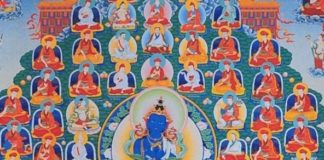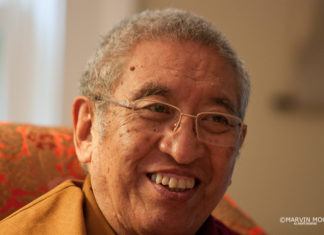We are delighted to announce that Johanna Demetrakas’s documentary on the life of Chögyam Trungpa has made its Canadian premiere at the Atlantic Film Festival on Monday, September 19th at 9:20 pm. The first screening of Crazy Wisdom: The Life & Times of Chögyam Trungpa Rinpoche took place during the Santa Barbara International Film Festival in February 2011. Since then it has appeared at the Boulder film festival, and Tricycle Magazine’s online Buddhafest. Trish Deitch reflects in her Tricycle review: “For those of us who never met Trungpa Rinpoche but came face-to-face with Buddhism through his books, watching Demetrakas’s film is like being introduced to someone we’ve fallen in love with from afar but never imagined we’d meet. There he is in the flesh, up on the screen, reminding us of our lost hearts, which recede further and further from us each day as the dark age grows darker.”
February 2011: Johanna Demetrakas talks about the premiere of Crazy Wisdom in Santa Barbara
Crazy Wisdom: The Life & Times of Chögyam Trungpa Rinpoche premiered at the Santa Barbara International Film Festival, February 4-6, 2011, enjoying sold-out screenings and enthusiastic audiences; and was named one of the “Best of Fest” films. I talked with Johanna by phone on February 10, 2011. Here’s our conversation:
Walter Fordham: Hi Johanna. Tell us about the premiere in Santa Barbara.
Johanna Demetrakas: Well it’s hard to describe because the feeling was so amazing up there. The International Santa Barbara Film Festival is an important festival. It’s not the top rung, like Sundance, but it’s quite important, and it’s a great place to premiere. So when we got accepted there, we could have waited and kept trying for a bigger, or more prominent, festival. But we decided it was a really strong festival, and it’s near Los Angeles, which is of course a huge film world, so we decided to do it. It was an amazing experience. It’s a full-fledged 12-day festival, with an enormous range of films.
We screened three times. They gave us the last weekend. We requested the last weekend because Sundance overlaps the Santa Barbara festival, and we wanted people to be there, and we wanted filmmakers to be there, and we wanted the press to be there. The first screening we had was at 8 o’clock in the morning. I got up at 5, and I’m driving to the theater hoping there’s at least 20 people there. I was really shaky about it, and I pull up and there’s a line of 50 people. We had almost 200 people attend that opening screening. We called it our “sneak peak.” So that was right away … I felt: “Oh my goodness, something’s happening here.” I only knew three people there, so it wasn’t just our Buddhist friends coming out. It was a whole new crowd of people. It was a wonderful audience … good questions.
Saturday was our premiere day, and I had contacted Jeff Bridges and left a message that we were screening the film. I sent him a trailer … he must have looked at the trailer … I got a reply that he was going to attend with six friends. So that was exciting, but we didn’t know if it was really going to happen. Anyway, it was our premiere night and we sold out a 354-seat house, and had to turn away about 50 people. Definitely, some friends of ours came, but that would only account for about 25 or 30 people.
At film festivals, when the film is over, there’s always a Q&A with the filmmaker. [Usually] when the film ends, about half the audience leaves, and you do your Q&A and that’s fine … that’s the way it is … But when our film ended [on Saturday night], only about six people left. The entire audience stayed for a 25 minute Q&A. It was very touching. Jeff Bridges did come with a party of six. He not only stayed for the Q&A, he stayed in the lobby and hung out with people, and he was very nice. He basically said, “I’ve known about old Trungpa for a long time. I’ve been interested in him for a long time.”
So, let me tell you. He is the Dude. [A reference to Bridges’ role in The Big Lebowski]. He is totally the Dude. He walks like the Dude. He talks like the Dude. He hangs out like the Dude. He really does. He was just sitting around afterwards. He didn’t leave his seat, even after the Q&A was over. So finally … I’m not pushy at all … I went up and introduced myself and said “thank you,” and we shook hands. I didn’t want to bother him. You know, stars get so much crap all the time. So he [just said], “very nice”. Then he was hanging out in the lobby with everybody, and finally, I went up to him and said “So what did you think” And that’s when he said “Oh yeah, I’ve been curious …”, or “I’ve been thinking about Trungpa for a long time.” I didn’t ask him anything else. I just left it at that, and enjoyed him, and let him have his fun.
WF: Well that really sounds like a fantastic beginning.
JD: It’s a great beginning. Santa Barbara Film Festival does this thing called Best of Fest, where they invite back films that were the most popular … for one more screening for the city of Santa Barbara, because Santa Barbara supports the film festival. So they invited us back. We’re one of the Best of Fest.
WF: Congratulations. That’s fantastic.
JD: Yeah, I’m going up next Sunday, and it’s going to screen again at 11 am.
WF: Wow. This is like 25 years for you …working on this.
JD: Well, you know, I shot the cremation in 1987 and I started to work on that afterwards, of course. I made a rough cut, and realized it was so powerful, I could make a film about the cremation. But, you know, what happened between 1987 and 1992. It was a very tumultuous time. Everything was falling apart. There was no money, no support … [the project] just kind of lay fallow. I decided, in the early 1990s, that I should just make a film about him. One of the reasons I was inspired to take that leap is that I had a meeting with Rinpoche when I was in Boulder in the summer of 1983, working on The Lion’s Roar. We had a little talk, and he asked me to make a Shambhala film. He said “I want you to make a Shambhala film.” So sometime in the early 1990s, I realized that this would be my Shambhala film for him. I talked to the Sakyong, he gave me his blessing … I started thinking, and I occasionally interviewed someone … I did some research … I had no idea how I was going to raise the money, because it’s not the kind of film I can take to people I know in the industry, and raise money; it’s just not. So it took awhile, and then … I dove into it almost five years ago. It’s almost five years now that I’ve been actively working on this film. I feel really good about what it is. You know, I finally let it go because I realized it’s there. It’s there. We put a lot of extra effort into this film to make it absolutely right.
WF: That’s great. Congratulations.












